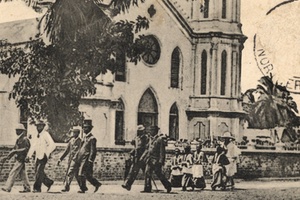This collection takes its inspiration from Ngũgĩ wa Thiong’o’s call for the abolition of the English department at the University of Nairobi in 1968. With his colleagues, Ngũgĩ launched an attack against an enduring colonial legacy and envisioned an intellectual renaissance in Africa. Conversely, in recent years, many departments have found themselves “abolished” for another reason: the neoliberal rhetoric of financial sustainability and austerity, despite the seeming financial health of such institutions. Indeed, we have two types of institutional intervention both framed under the rhetoric of “abolition”: the first driven by the desire to liberate education from epistemological and pedagogical domination; the second, it might be claimed, by the neoliberal business model. This special edition seeks to consider the chequered history of the westernised university, to diagnose its embattled present, and to imagine its future.
In recent months, academics, non-academic staff, students and their allies across the UK, Canada, the Netherlands, Ireland, Albania, Finland, Colombia, Mexico and elsewhere, have staged protests against neoliberal reform of universities. Wendy Brown argues that the evolution of neoliberalism from a set of economic policies into mode of reason imperils not just liberal institutions but democracy itself. Education across the board is jeopardised by the corporate university model. The liberal arts face multidirectional threats, of extinction and irrelevance. Yet as Gayatri Spivak suggests, if the humanities is the ethical healthcare of society, what resources can we summon to reform, destroy, transform, or re-create the university? Or less innocently, as Bill Readings suggests, simply foster a space where academics (and students) can “work without alibis” in acknowledgement that radical possibilities are constrained by the societies in which universities are situated.
The cross-disciplinary articles in this special edition were chosen from across the humanities and social sciences, as well as from the critical, creative and deviant work of educators and activists. In particular, the editors reached out to those who traditionally or purposefully find themselves outside the ivory towers: those not included and unassimilated.
Edited by: Martin Eve (Birkbeck, University of London) and Lou Dear (University of Glasgow)
Editorial
Introduction: The Abolition of the University
Martin Paul Eve
2021-05-19 Volume 7 • Issue 1 • 2021
Also a part of:
The Abolition of the University
Dismantling the Curriculum in Higher Education
Richard Hall and Keith Smyth
2016-04-15 Volume 2 • Issue 1 • 2016 • e11
Also a part of:
Doing Pedagogy Publicly: Asserting the Right to the City to Rethink the University
Cassie Earl
2016-10-27 Volume 2 • Issue 2 • 2016 • e3
Also a part of:
On Cleaning: Student Activism in the Corporate and Imperial University
Kristi Carey
2016-11-25 Volume 2 • Issue 2 • 2016 • e4
Also a part of:
Beyond Public and Private: A Framework for Co-operative Higher Education
Mike Neary and Joss Winn
2017-07-19 Volume 3 • Issue 2 • 2017 • 2
Also a part of:
Imperialism, Art and Pedagogy: Notes on Knowledge Production at the Frontlines
Zahra Malkani and Shahana Rajani
2017-03-01 Volume 3 • Issue 1 • 2017 • 6
Also a part of:
Special Collections
-
Diversity and Competition within the Latin Church: The Secular-Mendicant Controversy and its Long Aftermath (13th–20th Centuries)
Thinking the Political: Theory, Literature, Practice
Poetry Off the Page: Intersecting Practices and Traditions in British Poetry Performance
Humour as a Human Right
Cultural Heritage Data for Research: Opening Museum Collections, Project Data and Digital Images for Research, Query and Discovery
Literature as Imaginary Archive: Ephemera and Modern Literary Production
Caliban's Mirror: Reflections of James Joyce and Oscar Wilde
Cultural Representations of Machine Vision
The Public Curatorship of the Medieval Past
Medieval Minds and Matter
Representing the Medieval in Popular Culture: Remembering the Angevins
The Politics and History of Menstruation: Contextualising the Scottish Campaign to End Period Poverty
Production Archives 03: Archival Practices
Production Archives 02: Production Contexts
Production Archives 01: Puppets for Action
Representing Classical Music in the Twenty-First Century
The Pathological Body: European Literary and Cultural Perspectives in the Age of Modern Medicine
Binary Modernisms: Re/Appropriations of Modernist Art in the Digital Age
Local and Universal in Irish Literature and Culture
Reading in Ruins: Exploring Posthumanist Narrative Studies
The Language of Perspective
Nancy Astor, Public Women and Gendered Political Culture in Interwar Britain
The Working-Class Avant-Garde
Colonialities in Dispute: Discourses on Colonialism and Race in the Spanish State
Powering the Future: Energy Resources in Science Fiction and Fantasy
Writers and Intellectuals on Britain and Europe, 1918–2018
Literature, Law and Psychoanalysis
Muslims in the Media
Encounters between Asian and Western Art in the 20th and 21st centuries: a liberating influence for Asia?
Waste: Disposability, Decay, and Depletion
Pride Revisited: Cinema, Activism and Re-Activation
New Approaches to Late Medieval Court Records
Utopian Art and Literature from Modern India
Right-Wing Populism and Mediated Activism: Creative Responses and Counter-Narratives
Representing Climate: Local to Global
Cultivating Spheres: Agriculture, Technical Communication, and the Publics
Freedom After Neoliberalism
The Medieval Brain
Remaking Collections
New Approaches to Medieval Water Studies
Imaginaries of the Future 01: Bodies and Media
Imaginaries of the Future 02: Politics, Poetics, Place
Imaginaries of the Future 03: Utopia at the Border
Postcolonial Perspectives in Game Studies
Station Eleven and Twenty-First-Century Writing
#Agreement20
What’s Left? Marxism, Literature and Culture in the 21st Century
New Voices in Jewish-American Literature
Authors, Narratives, and Audiences in Medieval Saints’ Lives
From TV To Film
American Literature & the Transnational Marketplace
Mnemosyne
Healing Gods, Heroes and Rituals in the Graeco-Roman World
The Abolition of the University
